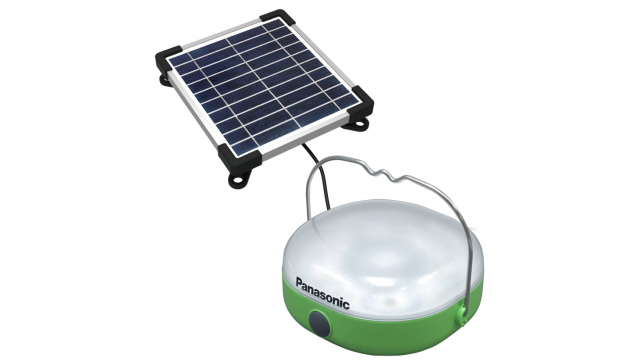
Dec 13, 2022
- Sustainability
- Feature Story
- Panasonic GREEN IMPACT
- India, Middle East and Africa

At events related to the coming Tokyo International Conference on African Development (TICAD), Panasonic will display a prototype of its new solar lantern designed to improve the lives of people living off-grid in the world.
Panasonic Corporation today announced that it has developed a solar lantern that doubles as a charger for people living without electricity. With a built-in rechargeable battery to store solar energy during the day, the lantern provides light at night and can also be used as a power source to charge small mobile devices like mobile phones. The company plans to bring the lantern to the market in autumn this year after conducting marketing research in off-grid areas in Asia and Africa. A prototype of the new solar lantern will be displayed at official side events*1 at the 5th Tokyo International Conference on African Development (TICAD V) to be held from June 1 to 3, 2013 in Yokohama. Panasonic will introduce the product to a variety of stakeholders joining the TICAD V.
About 1.32 billion people*2, or approximately 20%*2 of the world's population, are still living without electricity. Many of these people use kerosene lamps for lighting. However, kerosene lamps not only fail to provide sufficient light but also emit toxic fumes and pose a fire risk. In addition, people living off-grid are facing a problem of charging their mobile phones, which have become a popular communication tool for them.
To meet those challenges, Panasonic has developed the new solar lantern that provides clean and safe lighting and a power source. Gearing up for the planned product launch this autumn, the company will further refine the solar lantern to make it practical and convenient for everyday use by taking into account such specifications as brightness, charging time and battery run time in addition to the charging function for mobile phones and other small devices.
Besides selling at retail stores, Panasonic will make the product available to the wider public through the utilization of support programs offered by governments and international organizations and tie-ups with NPOs, NGOs and other social groups in efforts to contribute to the development of society. Starting with the solar lantern, its first product for BOP markets, Panasonic will continue to accelerate the development of BOP markets and strengthen marketing activities and product development to help improve the lives of people in regions without electricity.
Panasonic launched last year the "100 Thousand Solar Lantern Project" as part of its corporate citizenship activities, aiming to donate a total of 100,000 solar electric lights*3 to people in regions of the world without electricity by 2018, the 100th anniversary of the company's founding, through local social institutions including NPOs and NGOs.
*1. TICAD is a policy forum where diverse stakeholders participate in and share their expertise in regard with African development. Through official side events (May 30 to June 3, 2013), all the TICAD participants can have an opportunity to exchange opinions related to African developments.
*2. IEA World Energy Outlook, 2012
*3. In 2012, the first year of the project, Panasonic donated compact solar lights, instead of solar lanterns.
*4. BOP refers to the Base of the Pyramid, the low-income group in developing countries. BOP markets have unique aspects in which companies can contribute to solving social problems in these markets while pursuing added business value by serving the markets.
[Official side events (product exhibition)]
1. A booth at "African Fair 2013" (From May 30 to June 2, 2013)
Organizers: Ministry of Economy, Trade and Industry and Japan External Trade Organization (JETRO)
2. A booth of at "TICAD V" (From May 31 to June 3, 2013)
Organizer: Ministry of Foreign Affairs of Japan
[Official side events (lecture & presentation)]
1. A lecture at JICA seminar (June 1, 2013)
Organizer: Japan International Cooperation Agency (JICA)
2. A presentation at the symposium on the prevention of mother-to-child HIV transmission, the TICAD V program for first ladies.
Organizer: Ministry of Foreign Affairs of Japan
The content in this website is accurate at the time of publication but may be subject to change without notice.
Please note therefore that these documents may not always contain the most up-to-date information.
Please note that German, French and Chinese versions are machine translations, so the quality and accuracy may vary.